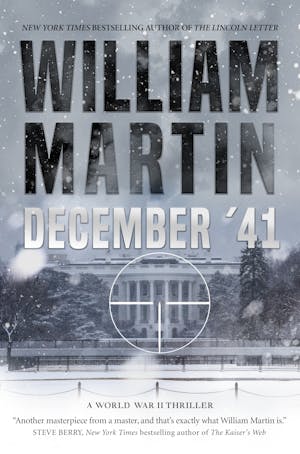MONDAY,DECEMBER 8, 1941
IT WAS THE LARGEST radio audience in history.
On the cold coast of Maine, they were listening. Down on Wall Street, trading stopped so they could listen. On assembly lines in Detroit, they were taking long lunches so the autoworkers could listen. In Chicago, the butchers stopped slaughtering in the stockyards to listen. In Kansas and Nebraska and Iowa, where they grew corn and wheat enough to feed the world, now that the rains had returned and the dust had stopped blowing, the farmers were listening there, too.
In all the places where the muscle and sinew of America bound one state or town or family to another, they were listening for the warm baritone and patrician inflections that somehow never sounded too upper-crusty coming out of the radio …
… because America had awakened that morning to the cold reality of war, war in every time zone, war encircling the earth, war once more as the original human fact.
In Hawaii, U.S. Navy battleships burned beneath great funerary clouds of black oil smoke. In the far Pacific, Japanese troops attacked along every line of latitude and longitude. In swirling blizzards of blood and snow, Russians and Germans slaughtered each other before Moscow. Across Europe, jackboots echoed and resistance guttered, while U-boats stalked freighters on the roiling gray Atlantic. But Americans were listening because Franklin Roosevelt was about to make sense of it all.
In Washington, the CBS radio announcer was describing the packed House chamber, the tense atmosphere … when suddenly his voice rose: “Now, ladies and gentlemen, the president is appearing and moving toward the podium.”
And from out of deep-bass consoles and tinny tabletop radios in every corner of the country, a roar exploded, something between a cheer and an angry shout, the harsh, hard, ferocious cry of Americans lifting themselves from shock and drawing strength from the president who’d lifted himself from a wheelchair and by remarkable force of will was appearing upright before them.
When the roar receded, the Speaker announced, “Senators and Representatives, I have the distinguished honor of presenting the president of the United States.”
More cheers and shouts, then Franklin Roosevelt’s voice rang out, firm, confident, indignant: “Mr. Vice President, Mr. Speaker, members of the Senate and the House of Representatives: Yesterday, December 7, 1941—a date which will live in infamy—the United States of America was suddenly and deliberately attacked by naval and air forces of the Empire of Japan.…”
In the West, radio stations had gone off the air the night before so that Japanese bombers couldn’t home in on the broadcasts.
But now, Roosevelt’s voice rolled across deserts, up and over mountain ranges, and down into the warm green dream of Southern California, down along boulevards laid like gridwork atop lettuce fields and orange groves, down onto long, straight, relentless thoroughfares that ended where scrub-covered hillsides leaped up to define and divide the expanse of Los Angeles, down into offices and coffee shops and cars where people were listening, unaware that as Roosevelt spoke, a Nazi assassin was shooting at targets in a local canyon and planning the most daring act of the age, unaware also that before it was over, he would draw many of them into his dark orbit.
* * *
ONE OF THEM, A young man named Kevin Cusack, was listening in the Warner Bros. story department. He and his friends should have been working. They were the gang who read the plays and novels sent out from New York, then synopsized them and offered opinions. A pile of books and manuscripts lay on the table. But Jack L. Warner himself was probably listening, so why shouldn’t they?
Kevin’s next assignment: a play called Everybody Comes to Rick’s. He didn’t hold much hope for it. All he needed to read was the story editor’s one-liner: “A love triangle set in wartime Casablanca.” He hated love triangles. But when you worked on the bottom rung in the story department for a buck twelve an hour, you took what they gave you.
And the job was good cover, along with his Irish surname and dark Irish brow. His friends in the German American Bund loved that he worked by day in a “nest of Hollywood Jews,” then went down to Deutsches Haus, the Bund hall, to drink German beer and deliver the gossip every night. If they’d known that he was really a spy who passed information to the Los Angeles Jewish Community Committee, who then passed it to the FBI, those jolly Germans might have killed him.
But he felt safe at the studio. When Roosevelt said, “No matter how long it may take us to overcome this premeditated invasion, the American people in their righteous might will win through to absolute victory,” Kevin cheered right along with those congressmen and senators back in Washington.
So did all the others around the conference table. Jerry Sloane, an emotional kind of guy, wiped away a tear. Sally Drake, the only female in the room, the girl with the Vassar accent and Katharine Hepburn slacks, put her fingers in her mouth and gave out with a big ballpark whistle. Pretty good for a college girl.
Kevin liked Sally. He liked her a lot. So did Jerry. And Jerry seemed to be winning. Maybe that was why Kevin hated love triangles.
Copyright © 2022 by William Martin





